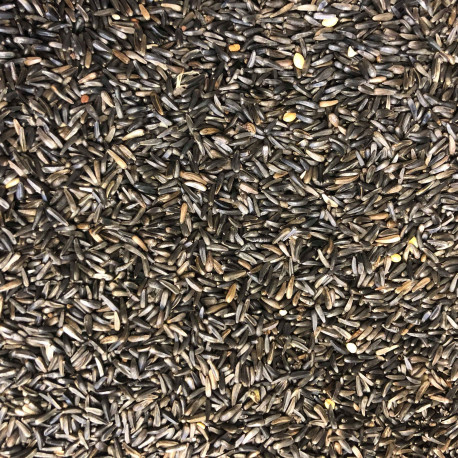



Reference: 103045150-kg
Niger, bird seeds rich in phosphorus and calcium. Niger seeds (or nyjer seeds) are fine seeds rich in oil. They come from Guizotia abyssinica (also called Oleiferous Guizotia). Niger is very popular with most birds, goldfinches and tarins love it.
Niger is one of the few bird seeds with a good calcium/phosphorus ratio.
Niger, bird seeds rich in phosphorus and calcium. Niger seeds (or nyjer seeds) are fine seeds rich in oil. They come from Guizotia abyssinica (also called Oleiferous Guizotia). Niger is very popular with most birds, goldfinches and tarins love it.
Niger is one of the few bird seeds with a good calcium/phosphorus ratio.
Chia is a sage. It is an annual plant that can reach 1 m in height, and its scientific name is Salvia hispanica.
The composition of the chia seed closely resembles that of other mucilaginous seeds like flaxseed and psyllium. Unlike flaxseed, chia does not have anti-nutritional factors, which limit the use of flaxseed without prior heat treatment. The anti-nutritional factors are cyanogenic glycosides or linatins, inhibitors of vitamin B6 that prevent its action. Chia also has a much more pleasant taste than flaxseed, and birds are more willing to consume it.
These seeds, rich in fats and proteins, are particularly appreciated by wild birds. They will attract redpolls, grosbeaks, goldfinches, black-capped chickadees, sparrows, mourning doves, and a host of other birds to your garden. They are often used as a substitute for rapeseed, which is more expensive.
Paddy rice seed or raw rice is perfectly suitable for exotic birds with strong beaks such as the Java sparrow and Asian-origin birds. This seed is also appreciated by parakeets, parrots, and exotic doves.
Chia is sage. It is an annual plant up to 1 m tall whose scientific name is Salvia hispanica.
The composition of chia seed closely resembles that of other mucilaginous seeds such as flaxseeds and psyllium. Unlike flaxseed, however, chia does not have anti-nutritional factors, factors that limit the use of flaxseed without prior hot treatment. Anti-nutritional factors are cyanogenic glycosides or linatins, inhibitors of vitamin B6 that prevent its action. Chia also has a much more pleasant taste than flaxseed and birds consume it more willingly.
High-quality seeds with a high fat content.
- With a high content of vitamin E, B9, B5, B6, B1, B2, B3, and vitamin K.
- It has antioxidant properties.
- Excellent energy contribution.
- Rich in calcium, potassium, magnesium, phosphorus, proteins, zinc, thiamine, pectin (cleanses the body).
The turnipseed is quite similar to rapeseed, with the difference being the more bitter flavour of the latter. Turnipseed is rich in protein and beneficial for enhancing singing, making it particularly interesting during the breeding season for canaries. However, as this seed is quite fatty, we recommend not exceeding 10% of your mix with turnipseed for colour canaries or posture canaries. For song canaries, turnipseed softens the song and can therefore be used at 30% of the mix: in this latter case, we recommend accompanying your bird's diet with liver support.
Baked and crumbled wheat biscuit.
Rusk is particularly suitable for the absorption of moisture in food.
Also ideal for mixing additives (vitamins, dyes, etc.) in food
Ideal for moistening egg pie.
Composition: wheat, water, salt and yeast.
A 100% natural product that is mixed with breeding or with food; It doubles in size by adding water.
Carrots are very rich in vitamins with a high proportion of vitamin A and carotene, as well as vitamin B, calcium and valuable carbohydrates.
Clover stimulates the immune system and slows down cellular ageing through its excellent antioxidant properties. Rich in vitamins B, C, E and provitamin A.
The canary seed is a grass, an annual plant up to 1m tall, the seeds being found in the inflorescences. These seeds make up a significant fraction of the majority of bird mixes.
• Excellent for canaries, European and exotic birds, wavy parakeets and large parakeets.
Improves liver and overall health of birds.
Suitable for a wide range of birds, including parrots, canaries, budgerigars, and other exotic birds.
Benefits for birds:
- Liver support.
- Detoxification: Helps eliminate toxins from the liver and improves digestion.
- Strengthening the immune system.
Instructions for use:
Dosage: Add a small amount (usually a teaspoon per day) to the birds' usual seeds. The amount may vary depending on the size and specific needs of the birds. Can be mixed with the birds' daily food.
Precautions:
Store in a cool, dry place, away from moisture and direct sunlight.
Niger, birdseed rich in phosphorus and calcium. Niger seeds (or nyjer seeds) are fine seeds rich in oil. They come from Guizotia abyssinica (also known as Guizotia oleiferous). The niger is highly prized by most birds, goldfinches and siskins love it.
The seed is mainly grown in India, Burma, Ethiopia and Nepal. Niger is an oilseed with a high fat content (38-43%) and protein content (23%). It provides quality food for all species of wild and forest birds, both in dry and sprouted form.
Niger is one of the few birdseeds with a good ratio of calcium to phosphorus.
Spinach seeds contain vitamins A, B1, B2, B3, B7, B9 and C, mineral salts and trace elements. Regular consumption helps to strengthen the feathers.

Niger, bird seeds rich in phosphorus and calcium. Niger seeds (or nyjer seeds) are fine seeds rich in oil. They come from Guizotia abyssinica (also called Oleiferous Guizotia). Niger is very popular with most birds, goldfinches and tarins love it.
Niger is one of the few bird seeds with a good calcium/phosphorus ratio.
